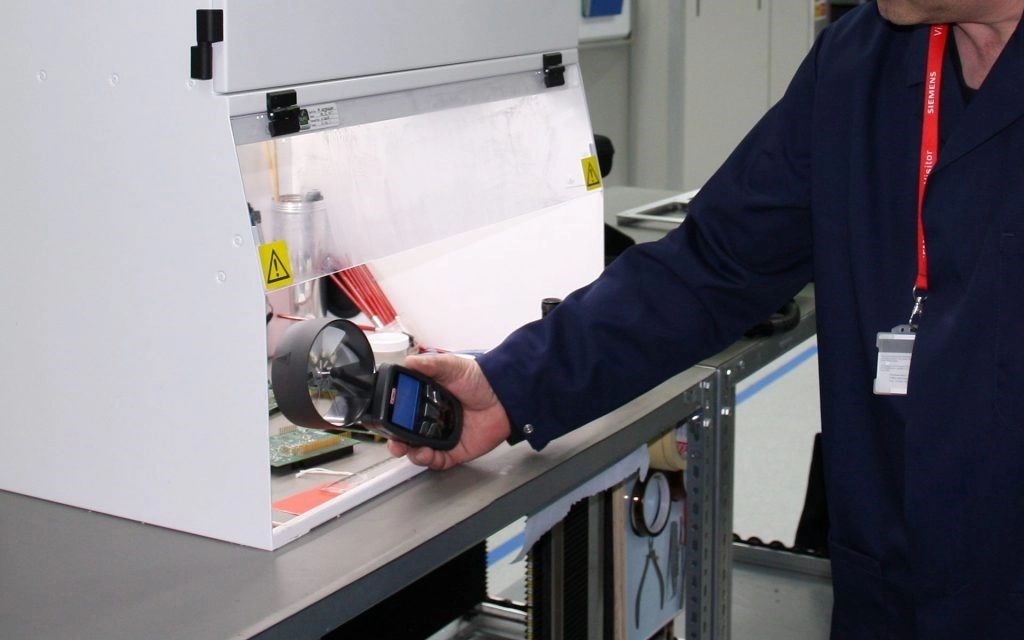What is a fume extraction system?
Published date: 30 September 2021

Fume extraction systems are used to extract and filtrate toxic fumes and dust from work environments. The performance of such systems is strictly regulated by workplace legislation.
A fume extractor is essentially a piece of equipment that pulls contaminated air with all of its particles and cleans that same air through a filter (or series of filters) before returning the newly clean air to the room. All dust particles and harmful gases should be caught within the filter after filtering (s).
The fume extractor fan, which provides the suction flow, and the filters, which filter the air, make this procedure possible.
Type of fume extraction filters
Depending on the type of particulates generated by your manufacturing processes and the outcomes you need, you might benefit from various fume extraction systems and filters such as:
| Type | Efficiency | Size of particles |
| ASHRAE | 95% | 0.5 microns |
| HEPA | 99.97% | 0.3 microns |
| ULPA | 99.995% | 0.12 microns |
| Activated Carbon/Specialty Blends | Un-consistent | N/A |
| Micro-Pleat/Cleanable | 95% | 0.3 microns |
Each type of filter is appropriate for a certain purpose and is effective against a variety of particles. So, what are those uses, and who is the most likely to profit from a fume extractor?
ASHRAE, HEPA, and ULPA filters are all intended to capture light dust and give some particle management. These filters may even collect microorganisms, making them perfect for use in household air ventilation systems.
Chemical fumes and organic vapour are absorbed by Activated Carbon (Specialty-Blended) filters. In pharmaceutical facilities, this term is frequently used. The efficacy of these filters is determined by the chemical absorbed and the application.
Micro-Pleat (Cleanable) filters are an excellent choice for intensive welding output and facilities with high particle levels in the air. Anywhere where there is a lot of soldering and welding. The filter is efficient against dust particles as well as some chemicals. Those filters are readily cleaned by applying pressurised air immediately adjacent to the filter. The pollution will be gathered in a catch can, making disposal simple.
Types of fume extraction systems
- Portable – thanks to the set of wheels installed at the bottom, these extractors may be simply carried wherever they are needed.
- Benchtop – mounted precisely where they are required. Ideal for soldering shops, pharmaceutical sorting, or any small-scale experiment that may produce vapours.
- Enclosed extractors — these extraction devices can be built into the work table. They can also be mounted on a shelf directly above the work stand or elsewhere.
- Wall-mounted extractors — As the name implies, these systems are designed to be installed on walls, usually directly above the fume application.
- Stand-mounted – the extractors in this sort of system are mounted on a stand. Depending on your choices, this stand could be permanently fixed to the ground or not. It can occasionally be relocated to another location of interest if it is not attached.
The best brands and products to extract fume
Conro Electronics, as an electronic manufacturing and fume extraction systems distributor, offers a wide choice of fume extraction systems from major manufacturers such as BOFA.
We’ll show you how to improve product reliability while increasing performance and lowering costs. Our team of technical support specialists will provide your company with dependable global supply, unrivalled efficiency, and superior technical support.
Feel free to contact us on 0208 953 1211 or send us an email to info@conro.com




Comments
There are currently no comments, be the first to comment.